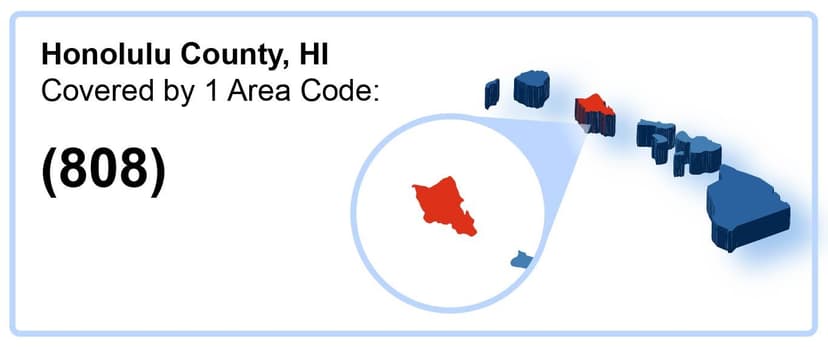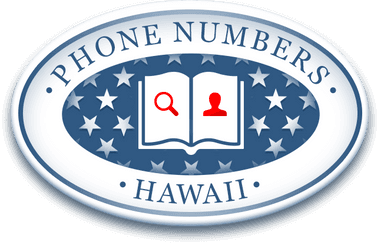What are Honolulu County Area Codes?

Area codes were established by the North American Numbering Plan (NANP) as part of the changes made to ease the process of making long-distance calls. An area code is the first three-digit sequence in a telephone number, and it specifies a numbering plan area (NPA) in a territory. The Public Utility Commission for the State of Hawaii administers area codes for Honolulu County.
Currently, there is only one area code serving Honolulu County and the entire State of Hawaii. This is:
Area Code 808
The 808 NANP numbering plan area covers all the inhabited and uninhabited parts of Hawaii and extends to Midway and Wake Islands. Area code 808 became active in 1957.
What are the Best Cell Phone Plans in Honolulu County?
Statistics from a 2018 National Health Interview Survey indicate wireless telephony services have become the primary form of telecommunication across the U.S. Figures for the State of Hawaii suggested that 51.6% of the total adult population exclusively used cell phones for telecommunications. Landline-only users accounted for just 3.2% of the same demographic. Among children (under 18 years) in households, the survey estimated 62.2% used only cell phones, while 0.3% relied exclusively on landlines for their telecommunication needs.
All four major telephone carriers are present in Honolulu County, as are numerous Mobile Virtual Network Operators (MVNOs). The major carriers’ service coverage is very good throughout the county, though coverage is tricky in deep valleys and remote areas. AT&T claims the widest coverage of the county and state, but Verizon boasts the best service. T-Mobile and Sprint follow closely, with Sprint offering the least coverage. Sprint has roaming agreements with the other networks to make up where it has shortfalls. MVNOs run on the networks of the major operators to provide services at cheaper rates.
Several companies provide VoIP phone services to Honolulu County residents and businesses. VoIP (Voice over Internet Protocol) uses IP networks, such as the internet, to provide a variety of telephony services that are more efficient and cost-effective than traditional alternatives. VoIP residential packages generally offer basic telephone services, while the business packages come with extra features.
What are Honolulu Phone Scams?
Phone scams involve the use of telephony services to commit fraud. Such scams are deceptive acts by fraudulent individuals seeking to obtain money or confidential information from Honolulu County residents. Reverse phone searches can perform suspicious phone number lookups and answer questions like “who is this number registered to?” and “who called?”
The Department of Commerce and Consumer Affairs (DCCA) issues consumer alerts on scams through its Office of Consumer Protection (OCP). Residents can file complaints on scams with the DCCA. Residents can also report scam cases to the Honolulu Police Department at their local police stations. Some common scams in Honolulu County include:
What are Impersonation Scams?
These are scams wherein the callers impersonate employees of law enforcement agencies such as the Honolulu Sheriff’s Department or the State Judiciary. The callers, claiming to be court officers or sheriff deputies, contact their targets about outstanding bench warrants issued for missing jury duties and court dates. The scammers offer to clear the warrants if the targets make payments; otherwise, deputies will arrest them. The scammers may also try to collect their targets’ personal information under the guise of identity verification. The callers ask for payments by wire transfers, prepaid debit cards, cash apps, and other irregular methods. They may also arrange to meet the targets at locations, such as the courthouse, to collect cash payments.
Legitimate law enforcement officials do not contact residents about outstanding bench warrants. They will also not threaten arrests over phone calls or ask for payments via unconventional payment methods. Note that scammers can spoof Caller IDs to display the names and numbers of these agencies when they call. Reverse phone number lookups can help determine if phone numbers displayed on your phone’s Caller ID are spoofed. If you receive such phone calls and are suspicious, hang up, and contact the law enforcement agency referenced to make direct inquiries.
What are One-Ring Scams?
In these scams, targets receive calls from scammers that hang up after one or two rings. The scammers aim to get the marks to call the numbers back and keep them on the line. Calling back these numbers incur international connection charges and run up premium per-minute toll charges on the targets’ phone bills. In instances where the marks do not call back, the scammers may leave voicemails, providing reasons why the targets should call the numbers back. The calls have typically come from numbers with 222 and 232 country codes, which belong to Mauritania and Sierra Leone. Phone number lookups can identify international numbers and their countries of origin. There is no reason to return these calls if you have no contacts in these countries.
What are Professional License Scams?
In these scams, fraudsters target licensed county professionals with false threats of investigations. Individuals impersonating state officials target licensed professionals in the county, such as medical doctors. The callers tell their targets that their professional licenses are under investigation. The scammers will typically spoof the names and numbers of the legitimate state and professional agencies that regulate the professions. They try to obtain private information from the targets and use them for identity and financial thefts. The scammers may even demand payments to “handle” the investigations.
The Professional and Vocational Licensing (PVL) division of the DCCA regulates all licensing programs in the State of Hawaii. They will not contact residents on matters relating to formal investigations. Phone number lookup services can help determine if the phone numbers displayed by Caller ID were spoofed. Residents who receive these phone calls should hang up and contact their respective professional licensing bodies or the PVL division on (800) 586-3000.
What are Text Message Scams?
These are bogus text messages purportedly sent by the targets’ phone service providers. Typical messages inform the targets that their phone payment methods are blocked and because the providers can no longer receive payments, their numbers will be disconnected. The texts include phone numbers for the targets to call, to resolve the issue. Targets who call these numbers are asked to provide information to reactivate their accounts. Providing this information grants the scammers access that they use to steal funds and identities.
Authorities advise residents never to give personal details to persons whose identities are unverified, especially over phone calls. Even if the phone calls appear to be from legitimate organizations, scammers can spoof Caller IDs to display this information, so always seek verifications. Recipients of such calls should terminate the calls and call their service providers directly to make inquiries. Reverse phone searches can shed more light on the authenticity of these types of phone calls.
What are Robocalls and Spam Calls?
While they will always be associated with political and telemarketing campaigns, robocalls have become the tools of phone scammers in recent times. Their ability to deliver automated messages to multiple consumers without any human interactions enables scammers’ activities. Also, because consumers are accustomed to receiving robocalls, they might be less vigilant when answering them, making it easier for scammers to fool their targets.
Scammers use robocalls to steal financial and identity records from victims by impersonating legitimate organizations. Consumers can identify incoming robocalls using free phone number lookups and then screen them. Some tips for stopping robocalls include:
- Phone manufacturers offer built-in tools for blocking spam calls in their phones. Use these functions to block robocall numbers. Reverse phone number search applications can also verify robocall numbers. Use free or paid versions of these applications to identify these numbers and block them.
- Include your phone number on the national Do Not Call list. Phone numbers included on this list are restricted from spam calls unless allowed by law. If you still receive spam calls after this, they may be scam calls.
- End a call once you confirm it is a robocall. Following any of the message prompts given during the call leads to more automated messages and marks your phone number for more robocalls.
- Submit a complaint to the FTC online or by calling 1 (888) 382-1222.
Consumers can find guidelines on blocking unwanted calls on the FTC website.
How to Spot and Report Honolulu County Phone Scams?
Applications that search phone numbers by name, address, and number can help answer questions like “who called me?” and “who is this number registered to?” This information can be useful when dealing with phone scammers. Remember, however, that the best tools for combating scammers remain vigilance and education. Scammers regularly fashion new schemes for defrauding unsuspecting residents, so staying informed and remaining aware are your best bets.
- The callers tell you about debts of which you are unaware. They then ask for payments through unconventional methods, such as wire transfers or reloadable prepaid debit cards. Scammers routinely use these types of irregular payment methods because of the difficulty tracking such funds.
- The callers are unable (or unwillingly) to provide satisfactory answers to questions you have about their claims. They use the excuse of time sensitivity to dissuade you from contacting third parties.
- The callers repeatedly request for your personal information. They try to convince you they need the information to verify identities. If you do not initiate the phone call, do not give your personal information to an unknown caller.
- The callers get aggressive and use coercive tactics to obtain your compliance. Legitimate authorities will not use threats against you on telephone calls.
- The callers offer free prizes and services, but you must make payments to receive them. If you receive offers of free items or prizes, and the offers come with demands of prepayments, these are scam offers.
Applications that perform reverse phone number lookups are available in paid and free versions. Public authorities that assist Honolulu County residents in dealing with phone scammers include:
Department of Commerce and Consumer Affairs (DCCA) - The DCCA promotes a healthy business environment and protects consumers from unfair and deceptive business practices. County residents can file complaints on scams with the Office of Consumer Protection of the DCCA.
Honolulu County Prosecutor - The County Prosecutor’s Office provides resources on prevalent scams and other fraudulent activities widespread in the county. Residents can contact the Prosecuting Attorney by visiting the office at 1060 Richards Street, Honolulu, HI 96813 or calling (808) 768-7400.
Honolulu Police Department (HPD) - The HPD is the primary law enforcement agency for the City and County of Honolulu. Residents of the county should report incidences of scams and other fraudulent activities to the nearest HPD station.
Federal Trade Commission (FTC) - The FTC initiates policies to protect consumers in the U.S. from fraudulent and unfair practices. One such policy is the National Do Not Call Registry, which exempts registrants from receiving spams calls unless allowed by law. Victims of scams and other fraudulent practices can submit complaints to the FTC.
